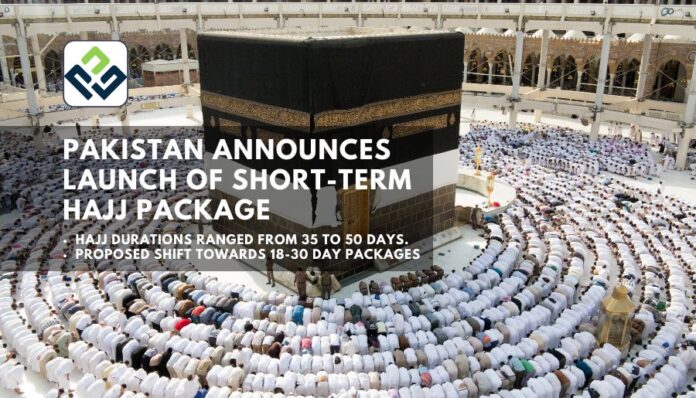In a groundbreaking announcement, the Ministry of Religious Affairs has unveiled a remarkable opportunity for Pakistani pilgrims – the chance to embark on a short-term Hajj journey starting next year. Aneeq Ahmed, the Federal Minister for Religious Affairs, revealed that this new initiative would offer pilgrims an 18-20 day Hajj package, providing them with flexibility in choosing between this shorter duration option and the traditional long-stay pilgrimage.
Typically, Hajj packages have been offered with durations spanning from 35 to 50 days, encompassing accommodation, transportation, and meals. This pivotal decision comes after discussions in the Religious Affairs sector, which proposed shortening the Hajj duration to 18-30 days.
This article delves into the significance of this development, its potential impact on Pakistani pilgrims, and the evolving dynamics of Hajj applications in light of changing costs.
The Significance of Short-Term Hajj:
The introduction of short-term Hajj is a momentous development that holds great significance for Pakistani pilgrims. This initiative offers a viable alternative to the conventional lengthy pilgrimage, catering to the diverse needs and preferences of the pilgrims. With an 18-20 day Hajj package on the table, individuals can now choose a more concise and focused spiritual journey, ensuring that their religious obligations are fulfilled without the extended time commitment. This flexibility is particularly beneficial for those with work and family responsibilities, making Hajj more accessible to a broader spectrum of the population.
A Shift in Pilgrimage Duration:
Traditionally, pilgrims embarking on the sacred journey of Hajj have committed to stays ranging from 35 to 50 days. This extended period often posed logistical challenges and constraints for many individuals. The proposed shift towards shorter durations of 18-30 days aligns with the evolving needs of the modern pilgrim. Shorter stays can reduce the financial burden and time commitment associated with Hajj, making it a more attractive option for prospective pilgrims.
Impact on Hajj Applications:
The allocation of Hajj quotas by Saudi Arabia has seen fluctuations in recent years. For Hajj 2023, the number of applications received was below the established quota. This decline can be attributed, in part, to the increased cost of performing Hajj. The introduction of shorter Hajj packages may have a profound impact on future application numbers. A more affordable and time-efficient option could lead to a surge in interest, potentially revitalizing the tradition of Hajj for a broader audience.
Enhanced Accessibility:
Short-term Hajj packages promise enhanced accessibility to the sacred pilgrimage. The reduced duration means that more individuals can participate without sacrificing their personal and professional commitments. This inclusivity aligns with the principles of Hajj, which seek to bring Muslims from diverse backgrounds together in unity and devotion.
Economic Considerations:
One of the notable factors influencing Hajj applications is the cost associated with the pilgrimage. The rise in Hajj expenses in recent years has deterred many potential pilgrims. Short-term Hajj packages may mitigate this concern, as they typically come at a lower cost due to the reduced duration. This economic advantage can make Hajj a feasible option for a larger segment of the Pakistani population.
Pilgrims’ Experience:
A shorter duration for Hajj does not diminish the spiritual significance of the pilgrimage. Pilgrims will continue to experience the profound sense of unity and devotion that Hajj embodies. Moreover, the convenience of shorter stays may even enhance the overall experience, allowing individuals to focus more intently on their spiritual journey.
Conclusion:
The announcement of short-term Hajj packages for Pakistani pilgrims is a monumental step towards making this sacred journey more accessible and adaptable to the needs of the modern world. This development holds the potential to revitalize Hajj applications, reduce financial burdens, and enable a broader segment of the population to fulfill their religious obligations. As we look ahead to the implementation of this new initiative, it is clear that the Ministry of Religious Affairs has taken a significant stride towards ensuring that the spirit and significance of Hajj remain accessible to all, fostering unity, devotion, and inclusivity among the faithful.

